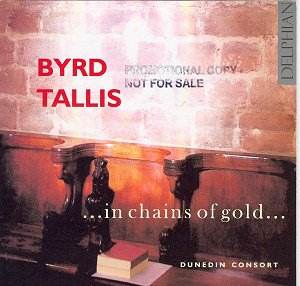The title of this disc is taken from comments
made by Thomas Morley (1557/1558-1602) concerning the behaviour
of performers. In his treatise on musical practice he criticised
members of church choirs for being more concerned to make their
voices heard above those of their fellows, than in ensuring, by
careful enunciation and more precise attention to the required
notes, "…whereby to draw the hearer, as it were, in chains
of gold by the ears to the consideration of holy things".
However, readers of this review need have no such fear, where
the behaviour of the Dunedin Consort is concerned, for their rendition
of these wonderful works is exemplary. Whilst I am not religious
and therefore am not drawn to the same considerations, I am eager
to hear more of this group’s recordings of similar works. I have
always been struck by the power a small number of voices can produce
in such repertoire and find it the most potent example of the
voice as instrument, especially in works such as these that are
scored for solo voices alone. So successful are these works that
you never feel the lack of other instruments – on the contrary
they would detract from the majesty that solo voices create.
The works on this disc are by two of the great
masters of the late renaissance. William Byrd and Thomas Tallis.
William Byrd (c.1540-1623) was born a Catholic and remained one
all his life despite the constraints this placed upon him in an
England where Elizabeth I had once again altered the official
religion of the country from Catholicism to Protestantism. The
three Masses he composed were all short in length so as to enable
them to be used in celebrations of Mass where previous richness
of ceremonial was no longer possible. They were all three published
anonymously between 1592-1595. Byrd was considered as the equal
of Lassus and Palestrina and his Masses are particularly outstanding
in terms of their contrapuntal style as the example on this disc
conclusively proves. This is music to make the hair stand on end
regardless of one’s religious convictions, and for me this only
adds to my listening pleasure. This Mass for five voices is the
longest work on this record and Byrd’s music is also represented
by some short works, organ hymns and an organ prelude. Thomas
Tallis (c.1505-1585) was a great influence on William Byrd and
when he died Byrd wrote an elegy with a text ending with the words
‘Tallis is dead and music dies’. The three Motets by Tallis are
taken from the Cantiones, quae ab argumento sacrae vocantur,
(London, 1575). In them, as with much of the music on this disc,
the so-called ‘English Cadence’ makes its appearance. It is a
device which sharpens the poignancy embodied within the writing,
and is characteristic of music of this period. Two organ hymns
by Tallis complete the disc. We are fortunate to be able to hear
these wonderful works that the common man of the 16th
and 17th Centuries would not have had access to, for
it was mainly the rich and powerful who were able to hear them
performed.
All the works on this disc are gems of Late Renaissance
composition and are beautifully recorded and sung by this young
Scottish group which has also recorded Mozart’s ‘Die Entführung
aus dem Serail’ and ‘Idomeneo’. I have only two criticisms and
they concern the all too brief liner notes and the far too tiny
print used. On the back of the disc where the details of the contents
are printed over a photo of a choir stall it is all but impossible
to read.
Steve Arloff
